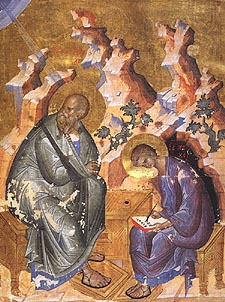|
|||
|---|---|---|---|
| This weekly bulletin insert complements the curriculum published by the Department of Christian Education of the Orthodox Church in America. This and many other Christian Education resources are available at http://dce.oca.org. | |||

The Holy Apostle John is given the title "Theologian" because his Gospel interprets events and words, delving into their meaning in the light of the divinity of Jesus Christ. Rather than just recording episodes, John (who, by tradition, was aided in his writing by Prochorus) sets them in the context of Jesus the Messiah's coming: "But to all who received him, who believed in his name, he gave power to become children of God...(1: 12). In the first chapter, John names four people—John the Baptist, Andrew, Philip and Nathanael—who recognize Jesus as the Savior, the One who fulfills the promises of Moses and the prophets. It is clearly a struggle to believe at first, at least for Nathanael, but Jesus rewards their recognition by assuring them that they will see "...heaven opened, and the angels of God ascending and descending upon the Son of man" (1: 51). John had a special closeness to Jesus. As we know, he is referred to as the "beloved disciple," and he is the only one of the four Gospel writers who records two events involving Jesus' beloved Mother. The first is the wedding at Cana (2: 1-11) at which Jesus responds to His Mother's concern for the bridegroom by changing water into wine. The second is Jesus' direction to Mary, as He hangs on the cross, to take John as her son, and to John that he care for Mary as his mother (19: 26-27). This loving, familial gesture is quite a contrast to Luke's Gospel, for example. There, Jesus' only words from the cross addressed to mothers are these in 23: 28-29: "Daughters of Jerusalem, do not weep for me, but weep for yourselves and your children. For behold, the days are coming when they will say, 'Blessed are the barren, and the wombs that never bore, and the breasts that never gave suck!'"
Despite his love for Jesus, John doesn't avoid writing about the hostility He faced, and about the struggles of some to believe His words. For example, in John 6: 35-44 Jesus tells the Jews, "I am the living bread which came down from heaven; if anyone eats of this bread, he will live forever..." The Jews "murmur" at this, wondering how He can claim to have come down from heaven when they know very well who His parents are. Their doubt is a bit like that of the Samaritan woman, who at first struggles to believe His claim that He has "living water" because He carries no vessel to draw from the well (4: 11). But the Samaritan woman does come to believe, as do many of the Jews. Struggle on the way to belief is no sin, and should come as no surprise. Jesus Christ warned us about it when He said, as John writes in 16: 4, "I have said all this to you to keep you from falling away." |
|||
